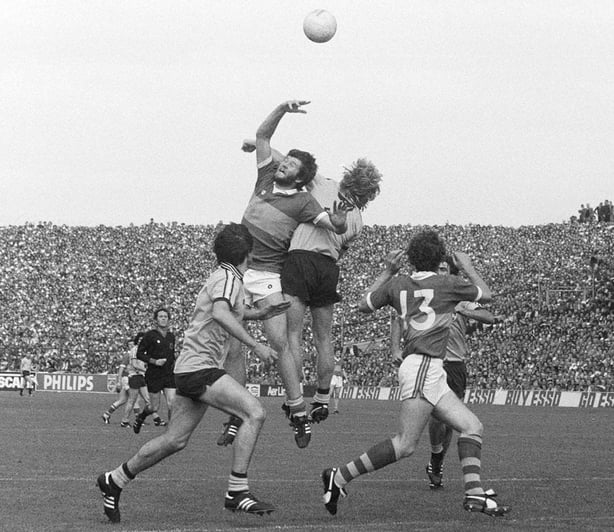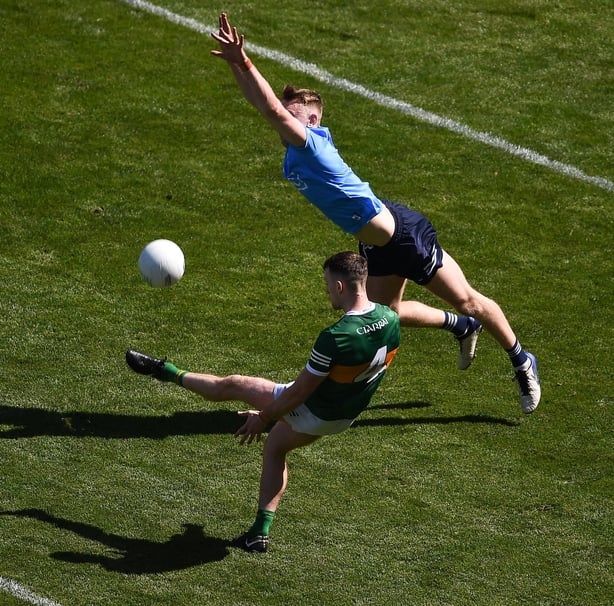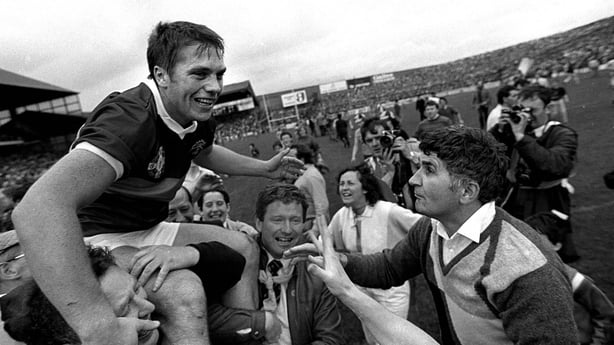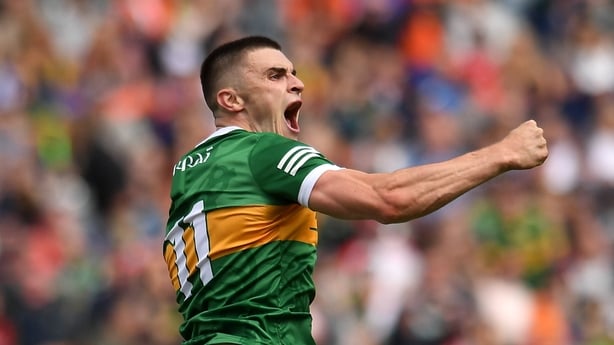With 1979 drawing to a close, then Kerry manager Mick O'Dwyer gave an interview to Eugene McGee of the Sunday Press.
McGee also happened to be the Offaly football manager. He would lead the Faithful County to the first of three successive Leinster titles in 1980, and in 1982, after semi-final and final defeats to Kerry, would finally get the better of O’Dwyer in one of the most talked about deciders in the association’s history.
All that would follow, but that December, McGee was primarily concerned with O'Dwyer's thoughts on the game in general.
O’Dwyer had much to be pleased about. Not only was Sam Maguire spending a second successive winter in their possession – the third of eight titles he would lead his county to – it had been collected in devastating fashion.
The wins of '75 (Kerry’s tyros), ‘78 (ending Dublin’s three-in-row bid), ‘80 (repelling Matt Connor in a semi-final and a pumped-up Roscommon in the decider) and ‘86 (a final swansong) all have their own merits, but there is a strong argument that 1979 was the best of the lot.
It began with the Massacre of Milltown Malbay where Clare were taken for 9-21. Cork at least put up a little more resistance, the 10-point Munster final defeat was the closest anyone would get in the championship.
For those of the view that the Munster championship has only recently gone past its sell-by date, Kerry’s 46-point aggregate winning margin in claiming the '79 provincial title was 12 points more than in 2023.
Monaghan were then pulverised, brutalised 5-14 to 0-07 in a lopsided semi, before Mikey Sheehy gave an exhibition as they swept aside a jaded Dublin by 11 points in one of the most comprehensive All-Ireland football final successes ever.

"We were at our best that year," says corner-back on the team Jimmy Deenihan, the future Fine Gael TD who won the third of his five Celtic Crosses in '79.
"We were untouchable. We matured into a real unit, having developed a massive understanding, and we did it spontaneously. There were no set patterns, we just understood each other’s play so well."
The fact victory was achieved over Heffo’s Army would have been the cherry on top.
Having gone a decade without a championship clash, ‘79 marked the fifth successive season meeting – curiously it would be another five years until they crossed paths again – and that particular rivalry has arguably never been surpassed.
The Kingdom shaded matters 3-2, with a combined winning margin of those wins in ’75, ’78 and ’79 of 35 points.
O’Dwyer’s interview that December was headlined ‘Appoint a full-time coach and pay him’ so it is likely his observations ruffled a few feathers within the association.

The Waterville native believed that more money should be funnelled into coaching and development rather than stadium infrastructure, before going on to suggest that a dilapidated Croke Park was in need or urgent repair.
"There are more shower units here in our local GAA grounds in Waterville than there are in Croke Park," he said.
Deenihan, an All-Star in 1981, says O’Dwyer was ahead of his time in adopting a player-first focus.
"He was a visionary, with very different views than Croke Park," he said. One area where he was resolute was the function of the full-back line, there purely to snuff out marquee players rather than venture downfield.
Deenihan played 29 championship games in the Kerry full-back line before injury forced an early retirement, having never taken a shot on in championship.
"O'Dwyer felt the full-back line was like the front row in rugby," the Feale Rangers man said. "He was defensively conscious and we were directed to mind the goals. He felt a defender going forward would have been only clogging up space for their clinical finishers."

The evolution of the game is perhaps best illustrated by the fact that that Tom O’Sullivan, the All-Star corner-back, has played one championship game more for Kerry than Deenihan, yet has reeled off an eye-watering 1-26 from forays up the field.
O’Dwyer criticised meagre player expenses – he described the All-Ireland final team allocation of £2,500 as an "insult" - while also stating he felt "very strongly" that the punching of a player [in the body] in possession as a means to dispossess needed to be removed from the game.
"This is being done today a great deal and that’s why you have so much rough and tumble in the game," he observed.
For all that however, "the game of football is not far from being perfect at the moment from a technical level".
Yet the main issue highlighted was around the overall competitive landscape, or more to the point, the lack of one.
It had been six years since a team outside of Kerry or Dublin lifted Sam, with three of the previous four finals featuring those two sides.
"I believe it would greatly help the weaker counties if the National League was run in the summertime in conjunction with the championship so that they could have football at the right time of year," O’Dwyer said.
"There’s no good in saying, ‘get rid of Kerry’. It should be the ambition of every weak county to play the Kerrys and Dublins in the championship."
In the previous 20 years, Dublin or Kerry had won 50% of the All-Ireland titles, with seven different counties sharing the rest.
In the following 20 years, owing to the more democratic era of the '90s, nine different counties tasted ultimate honours with the Kerry/Dublin ratio dipping to 40%.
But what would O’Dwyer make of the last 20 years, when the Dublin juggernaut has dominated the landscape? Just five counties have lifted Sam in that period, with the Dublin/Kerry win percentage rising to 75%.
You have to go back almost 30 years since the Dubs last tasted defeat in an All-Ireland decider, and the balance of power has certainly swung to the capital. Kerry are 0-4 against their rivals in All-Ireland finals since prevailing in the 1985 decider.

Deenihan says there are counties doing their bit to break the stranglehold: Galway have shown glimpses of their potential, Mayo are always somewhere in the mix, Tyrone, winners in 2021, have the ability to come from the pack to usurp those around them while Derry are the "coming" team, yet the status quo remains the same.
The balancing act of having a truly competitive championship but also keeping the flame of the most traditional rivalry alive is not a simple one for the association.
"Everybody loves to see a Kerry-Dublin final, that gets the juices flowing," Bernard Brogan senior tells RTÉ Sport.
It didn't take long for the returning Jack O'Connor to steer the Kingdom to top honours again, the '22 All-Ireland success built largely on Sean O’Shea’s brilliant free in the dying embers of a gripping semi-final joust with the Dubs.

The Dubs, far from vintage all year and minus the services of Con O’Callaghan, rallied courtesy of a Ciaran Kilkenny tour de force, yet it took a 55m injury-time free into a swirling wind for O’Connor’s side to prevail.
A year later, with serious cavalry added to their ranks, the men in blue proved too strong yet again. Any clash in 2024 is likely to have a significant say in where Sam Maguire ends up.
"Dublin just have that way of winning tight games," says Brogan senior. "They are not that far ahead even though they have won a lot," though he is concerned by the mileage on the clock on some of Dessie Farrell's players.
"Can they keep it going in 2024? It's hard to tell."
Deenihan can't see a shift in the balance of power over the coming 12 months.
"Dublin are very much in the ascendancy," he says. "The Dublin preparation - mental as much physical - has been very professional and that is what is getting them over the line. They showed that against Kerry this year.
"Psychologically they have that edge."


